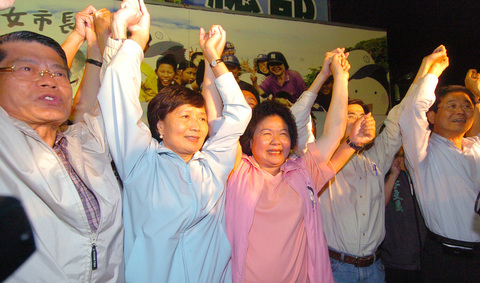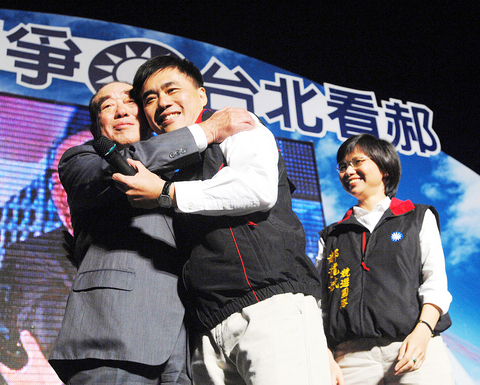Elections in Kaohsiung and Taipei yesterday resulted in a consolidation of power by the nation's two main political parties, as voters largely ignored a series of high-profile scandals and voted along traditional party lines.
Although many observers, especially in the international media, were depicting the poll as a "referendum" on the president and the Democratic Progressive Party (DPP), this was clearly not the case, as the election maintained the current balance of power in the cities' mayorships and city councils. The Chinese Nationalist Party (KMT) retained its hold on the Taipei mayorship, while the DPP's candidate won in Kaohsiung.
Notably, the DPP as well as the KMT picked up city council seats in both Taipei and Kaohsiung as they ate away at the minority of seats held by independents and smaller parties.

PHOTO: HUANG CHIH-YUAN, TAIPEI TIMES
The People First Party (PFP) -- whose members have been among the most strident critics of the president -- was eviscerated at the polls, losing nearly two-thirds of its council seats in the special municipalities of Taipei and Kaohsiung, the nation's two largest cities.
In Taipei, KMT candidate Hau Lung-bin (郝龍斌) captured the mayorship by a 12.92 percentage point margin over his DPP opponent, Frank Hsieh (謝長廷). PFP Chairman James Soong (宋楚瑜) -- a one-time presidential contender -- won a meager 4 percent of the vote.
In Kaohsiung, DPP candidate Chen Chu (陳菊) won the mayorship by a 0.14 percent margin -- only 1,114 votes more than KMT candidate Huang Chun-ying (黃俊英).

PHOTO: CNA
TAIPEI CITY COUNCIL
In the Taipei City Council, the KMT remains the biggest party, while the pan-blue camp retains a majority with 11 seats more than the pan-green camp.
The KMT gained four seats, bringing its total to 24, while the DPP also gained a seat, leaving it with 18 of the council's 52 seats. The PFP was the biggest loser of the Taipei poll, shedding six of the eight seats it previously held, leaving it with only two.
The pro-independence Taiwan Solidarity Union (TSU) made gains in Taipei by winning two seats; it previously held none.
The pro-unification New Party lost a single seat, dropping its number to four. The final two seats in the Taipei City Council will still be held by independents.
KAOHSIUNG CITY COUNCIL
Of the 44 Kaohsiung City Council seats, the KMT had the largest gain, winning 17 seats -- five more than it won in 2002. The DPP gained one seat, raising its total to 15, while the PFP lost three seats, leaving it with only four. The TSU lost one of the five seats it previously held, while the number of independent councilors fell from nine to seven.
The independent candidates will hold the balance of power between the 16-seat green camp and the blue camp's 21 seats.
KAOHSIUNG MAYORSHIP
DPP Kaohsiung mayoral candidate Chen Chu defeated her KMT counterpart Huang Chun-ying in yesterday's election.
Chen Chu obtained 379,417 votes, while Huang earned 378,303 votes, according to the Kaohsiung City Election Commission.
Chen Chu is the first female mayor of a special municipality.
"Although this was a tough battle, what I saw was the continuity of democracy," she said.
Chen Chu's campaign headquarters announced her victory and lit fireworks after she had secured around 380,000 votes.
Hundreds of Chen Chu's supporters overwhelmed the headquarters long before 4pm, the voting deadline.
However, the KMT has refused to accept the result, saying it would file a lawsuit asking the Kaohsiung District Court to nullify Chen Chu's election to the mayorship.
KMT Legislator Huang Chao-shun (黃昭順) and a number of KMT politicians led Huang Chun-ying's supporters to the Kaohsiung District Prosecutors' Office last night to demand a recount.
Some 400 police officers were called in to maintain security at the scene. At press time there were no reports of clashes.
By law, a candidate can file an "election result nullification lawsuit" within 15 days of the Central Election Committee's official announcement of the results.
Huang Chun-ying's spokesman, Apollo Chen (
On Friday night, Chen Chu's camp accused Huang Chun-ying of being involved in vote-buying.
The KMT said that after it filed a lawsuit, it would also ask the court to seize the ballots and recount them.
Apollo Chen yesterday also went to the Kaohsiung District Prosecutors' Office to file a lawsuit against Chen Chu, accusing her of slander and violating the Election and Recall Law (
Many Huang Chun-ying supporters broke into tears when it was announced that he had lost.
They began chanting "recount" as Huang Chun-ying spoke to them at his headquarters.
Kaohsiung police yesterday deployed police to KMT headquarters in order to prevent clashes but nothing eventuated.
TAIPEI MAYORSHIP
Unsurprisingly, KMT candidate Hau Lung-bin dominated the Taipei mayoral election yesterday, winning 53.81 percent of the vote against DPP candidate Frank Hsieh's 40.89 percent.
James Soong, running as an independent, received only 4 percent of the vote. Hau took 692,085 votes to Hsieh's 525,869 votes, while Soong took 53,281 votes, according to the Taipei Municipal Election Committee.
Still, the KMT's victory stood in contrast to 2002, when Taipei Mayor Ma Ying-jeou (馬英九) drubbed the DPP's candidate, Lee Ying-yuan (李應元), winning by a 28 percentage-point margin.
Compared to a turnout of 70.61 percent in 2002, this year's turnout fell noticeably to 64.52 percent.
Three hours after polls closed at 4pm, Hau Lung-bin gave a victory speech from his campaign headquarters accompanied by his father, former premier Hau Pei-tsun (
"This election is a war between integrity and corruption, and the result showed that the clean KMT defeated the corrupt DPP. More importantly, the victory today belongs to all Taipei residents," Hau said.
In response to the comparatively low voter turnout and his having attracted much less of the vote than Ma Ying-jeou, Hau Lung-bin blamed the DPP, saying the government had discouraged people from participating in politics by its poor performance.
Meanwhile, Frank Hsieh conceded defeat as a crowd of supporters chanted "Go for the presidency! Go for the presidency!"
Nearly 10,000 supporters began to flood Frank Hsieh's campaign headquarters from noon yesterday.
Hsieh's supporters were relatively calm, and no one at the scene shed tears as the gap between Hsieh and his opponent grew wider.
Hsieh, DPP Chairman Yu Shyi-kun and Premier Su Tseng-chang (
"We shall accept the results and the fact that we lost the election. That is the spirit of democracy. But I want to apologize to my supporters that I did not accomplish the mission and fulfill your wishes," Hsieh said. "I had a hard time as the ballots were cast this afternoon. But, failure is failure. I will accept it."
Yu Shyi-kun said that the party appreciated Frank Hsieh's efforts, although he did not win, because he gave a helping hand while the DPP was in a rut and frustrated by a seemingly endless series of scandals.
"Hsieh was willing to go for the election on behalf of the DPP although he knew it was going to be a difficult battle. For that, I sincerely express my gratitude to him," he said.
After the chairman finished his remarks, the premier and Hsieh left with him for DPP headquarters.
At campaign headquarters, Hsieh's chief campaign staff members, including Council of Labor Affairs Chairman Lee Ying-yuan and former Government Information Office minister Pasuya Yao (
But none of them seemed saddened by the defeat.
DPP Legislator Kuan Bi-ling (管碧玲) said that Hsieh had demonstrated his ability to unite a team throughout the election.
"I would say that it will be better for him to plant more roots, instead of trying to lead the DPP at the moment. Making a change within the public is a lot more difficult than making a change inside the DPP," Kuan said.
Reporting by Flora Wang, Mo Yan-chih, Jimmy Chuang, Rich Chang and Mac William Bishop

AIR SUPPORT: The Ministry of National Defense thanked the US for the delivery, adding that it was an indicator of the White House’s commitment to the Taiwan Relations Act Deputy Minister of National Defense Po Horng-huei (柏鴻輝) and Representative to the US Alexander Yui on Friday attended a delivery ceremony for the first of Taiwan’s long-awaited 66 F-16C/D Block 70 jets at a Lockheed Martin Corp factory in Greenville, South Carolina. “We are so proud to be the global home of the F-16 and to support Taiwan’s air defense capabilities,” US Representative William Timmons wrote on X, alongside a photograph of Taiwanese and US officials at the event. The F-16C/D Block 70 jets Taiwan ordered have the same capabilities as aircraft that had been upgraded to F-16Vs. The batch of Lockheed Martin

GRIDLOCK: The National Fire Agency’s Special Search and Rescue team is on standby to travel to the countries to help out with the rescue effort A powerful earthquake rocked Myanmar and neighboring Thailand yesterday, killing at least three people in Bangkok and burying dozens when a high-rise building under construction collapsed. Footage shared on social media from Myanmar’s second-largest city showed widespread destruction, raising fears that many were trapped under the rubble or killed. The magnitude 7.7 earthquake, with an epicenter near Mandalay in Myanmar, struck at midday and was followed by a strong magnitude 6.4 aftershock. The extent of death, injury and destruction — especially in Myanmar, which is embroiled in a civil war and where information is tightly controlled at the best of times —

Taiwan was ranked the fourth-safest country in the world with a score of 82.9, trailing only Andorra, the United Arab Emirates and Qatar in Numbeo’s Safety Index by Country report. Taiwan’s score improved by 0.1 points compared with last year’s mid-year report, which had Taiwan fourth with a score of 82.8. However, both scores were lower than in last year’s first review, when Taiwan scored 83.3, and are a long way from when Taiwan was named the second-safest country in the world in 2021, scoring 84.8. Taiwan ranked higher than Singapore in ninth with a score of 77.4 and Japan in 10th with

SECURITY RISK: If there is a conflict between China and Taiwan, ‘there would likely be significant consequences to global economic and security interests,’ it said China remains the top military and cyber threat to the US and continues to make progress on capabilities to seize Taiwan, a report by US intelligence agencies said on Tuesday. The report provides an overview of the “collective insights” of top US intelligence agencies about the security threats to the US posed by foreign nations and criminal organizations. In its Annual Threat Assessment, the agencies divided threats facing the US into two broad categories, “nonstate transnational criminals and terrorists” and “major state actors,” with China, Russia, Iran and North Korea named. Of those countries, “China presents the most comprehensive and robust military threat